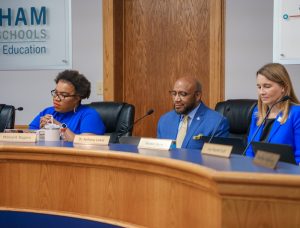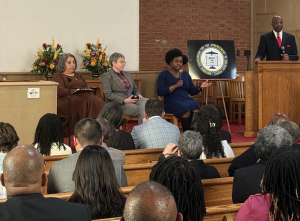It’s 4:15 on Friday afternoon, and a crowd of Durham Public School workers and families are playing Heads Up! to pass the time. “Anyone need a snack?” a woman in a #WeAreDPS T-shirt calls out, waving Ritz peanut butter crackers above her head. The Durham Public Schools Board of Education meeting started at 3 p.m., but the board has scheduled a closed session for the first hour and a half.
Today’s meeting is to figure out a salary plan for DPS classified workers — teaching assistants, cafeteria workers, or almost everyone who isn’t a teacher — in the month of February. In October 2023, DPS announced raises for all classified workers only to realize in January that their budget couldn’t live up to their promise. DPS notified staff that the district couldn’t continue paying the raised salaries in an email on Jan. 12, the Friday before MLK weekend.
“I thought it was a bad joke,” said Rob Griffin, the lead plumber at DPS.
The effect of the error on classified workers was enormous. “There’s people who have bought cars, houses, quit jobs because they didn’t need a third job anymore,” Griffin said. “There’s people who have left their spouses.”
DPS pulled $4.5 million from its fund balance — or savings account — to cover the new salaries through the end of January. Now, the question to be answered at this “special meeting:” What will happen this month?
In a PowerPoint, Assistant Superintendent for Human Resources Alvera Lesane lays out two options.
One is to implement a salary plan based on “steps,” or the years of experience an employee has, but only in the public sector and within the state of North Carolina. This would mean a large decrease in credited experience for many employees, which would negatively affect their pay. The plan would include a state-funded 4% raise over workers’ 2022-23 salary, but it’s unclear if the raise would be applied to all workers evenly. This option was the plan proposed in the Jan. 12 email. The plan would cost approximately $91.2 million, according to Lesane.
The second option is to implement an overall 11% raise for classified workers over their 2022-23 compensation. Only 7% of this raise would be locally funded, with the other 4% coming from the state. Salaries would still be based on steps, but would recognize out-of-state experience. However, “some employees would receive less compensation than stated in the January 2024 letter,” according to the presentation. This plan would cost slightly less at $90.2 million, Lesane says.
Both options are within the current budget, according to Lesane. By contrast, continuing to pay classified employees at the October rates would cost an extra $700,000 per month, according to DPS’ new acting CFO Cierra Ojijo.
Before opening up the floor to audience remarks, board chair Bettina Umstead reads a statement. She explains that some of the raises granted in October were “very large,” citing that 500 employees received raises of more than 25% compared to the previous school year. But, the workers aren’t having it. “Yeah,” a woman yells, “And?”
DPS workers are far from overpaid, Griffin says. “Everybody’s already paid below industry standard,” he explains. Susan Beierholm, a DPS transportation worker, says that she hasn’t seen a raise since she started nine years ago. Griffin, in his 10 years, hasn’t either. “If we don’t fight now,” Beierholm says, “we’re never gonna see one again.”
The floor opens up for discussion, and an onslaught of emotional testimonies ensues. A school nurse explains that nursing degrees can require out-of-state experience to complete, making state-only experience steps unfair. A DPS parent points out that both plans foster division among employees by “rewarding one group to harm another.” A former maintenance worker calls out the cost of the board’s three-day beach trip last summer. “You’ve gotta pay what you promise,” he said. “It’s as simple as that.”
Tammy Philips, an area manager for DPS transportation services, said that underpaid and under-resourced DPS staff are “asked to squeeze blood out of a turnip every single day and make things work.”
“Hold yourself accountable,” she urges board members. “Squeeze that turnip. Make it work.”
After the discussion, the board stays silent for a moment. “We… have… been struggling,” board member Jessica Carda-Auten begins. “No you haven’t!” shouts an audience member. “Your rent is paid!”
Over the course of the next two hours, the board members debate how to move forward. The two options presented are confusing, and they ask question after question to try to understand them. But, there’s a deadline — payroll needs to be sorted out by Feb. 6 at noon — and there’s no clear path forward.
On one hand, they need to make a decision that the school system can afford in the long term. And they need to do so quickly, so that workers can plan ahead. But, now that raises are within reach, workers are unlikely to settle for less.
Although the focus of this meeting is only the month of February, with plans to work out a more equitable solution for March, there’s no guarantee today’s decision won’t stick. And many workers have lost faith in DPS. “I work for a school district that can’t even spell ‘plumber’ right,” Griffin says, pulling out his badge, which reads LEAD PLUMMER. “Obviously they cannot do mathematics.”
Throughout the meeting, frustration echoes through the crowd. Signs reading “DPS vs EVERYBODY” dot the room. “She just fucking lied!” a woman whispers in response to a board member’s comment. When board members say they will fix the issue later, it’s just not good enough for some listeners. “How do we trust?” asks a PTA parent in response.
But that’s exactly what the board does. After a motion to pass the second option fails 5-2 and a motion to pass the first option dies on the floor, the board members appear hopeless. “How do we proceed?” Umstead asks. Reluctantly, the board passes a motion 4-3 to table the discussion until Feb. 8, pushing back the payroll deadline.
For the workers who spent five hours of their Friday evening to finally get answers, this only makes them feel more “betrayed,” Griffin says. “Devalued.” The brunette woman in front of me looks tired. “I see you,” board member Jovonia Lewis offers to the crowd in sympathy. The woman in front of me simply shakes her head.
Editor’s note: Additional reporting for this story was contributed by Nina Moske.
Sofie Buckminster




